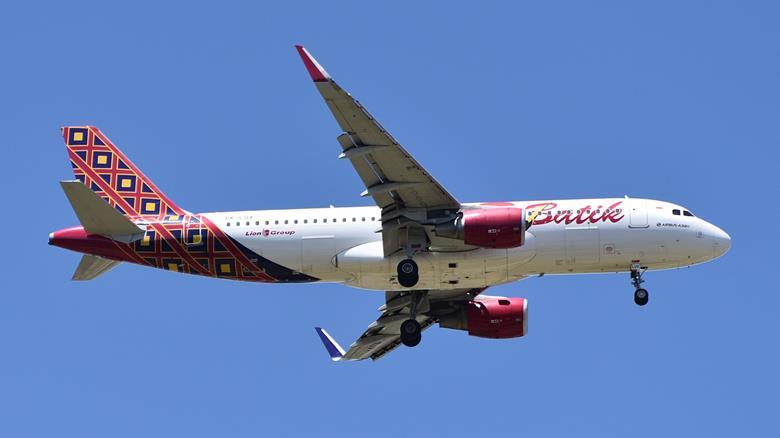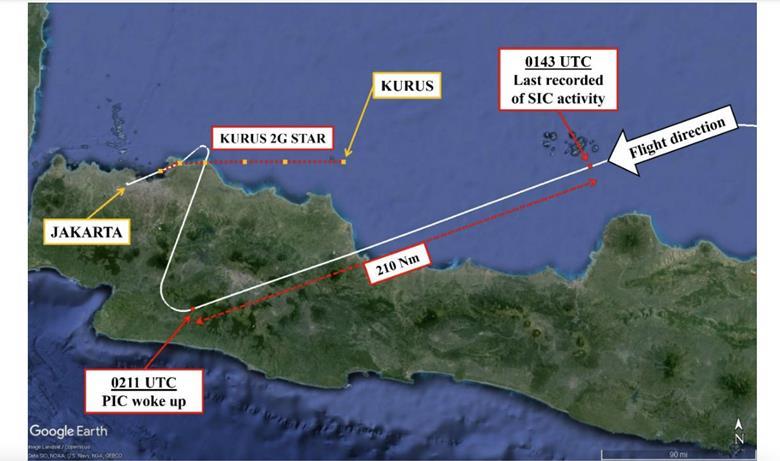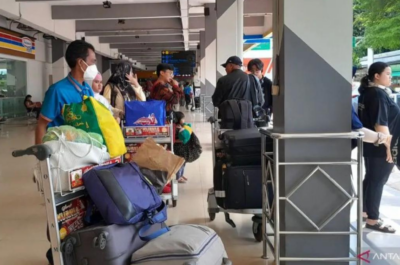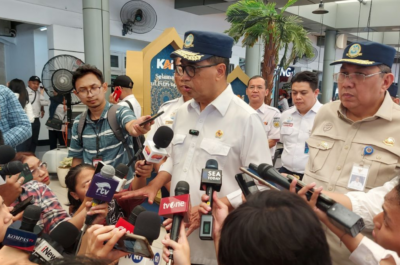
Batik Air pilots doze off mid-flight, raising serious concerns. Investigation highlights pilot fatigue as a critical issue. Calls for stricter guidelines and crew support systems to prioritize safety.
The recent incident involving two Batik Air Indonesia pilots who inadvertently fell asleep during a flight, as investigated by the Indonesian National Transportation Safety Committee (KNKT), has shed light on the critical issue of flight crew fatigue in the aviation industry. The event, which occurred on January 25th on a flight from Kendari to Jakarta, involved significant navigation errors due to both pilots sleeping simultaneously for approximately 28 minutes. This incident, classified as “serious” by the KNKT, underscores the urgent need for aviation stakeholders to reevaluate and enhance guidelines surrounding flight crew fatigue management.

Source: Screengrab via KNKT
Flight tracking data shows the deviation of the A320’s flight path.
A Wake-up Call for the Industry
The flight, operated with an Airbus A320 (PK-LUV), highlighted several key factors contributing to the perilous situation. The pilots, aged 32 and 28, had embarked on flight ID6723 after having flown the reverse route earlier that same day. Notably, the first officer, a new parent to one-month-old twins, reported inadequate rest due to parental responsibilities, which inevitably impacted his performance. Despite Batik Air Indonesia’s existing operational manual, which includes a section on pilot health and medical fitness, the KNKT’s preliminary findings suggest a lack of detailed guidance or procedure for utilizing the manual’s personal checklist to assess fatigue and other impairments.
The Need for Detailed Guidance and Procedures
The incident brings to the forefront the importance of not only recognizing the signs of fatigue but also having robust, actionable procedures in place for its management. The KNKT’s recommendations for Batik Air Indonesia to develop detailed procedures for conducting cockpit checks underscore a broader necessity within the aviation industry for comprehensive strategies that ensure the well-being of flight crews and, by extension, passenger safety.
Strategic Recommendations for Managing Flightcrew Fatigue
Enhanced Fatigue Risk Management Systems (FRMS): Airlines should implement or refine FRMS, incorporating scientific principles to monitor and manage crew fatigue. These systems must include detailed guidance for assessing fatigue levels and determining fitness for duty.
Training and Awareness: Continuous education and training programs for flight crews on the risks associated with fatigue, its symptoms, and effective coping strategies are essential. Awareness initiatives can empower individuals to recognize fatigue and take necessary actions before safety is compromised.
Scheduling Practices: Reevaluation of scheduling practices to ensure adequate rest periods between flights is crucial. Airlines should consider flight duration, time zones crossed, and the physiological needs of their crew, particularly for those with young families or other caregiving responsibilities.
Support Systems: Establishing support systems, including access to rest facilities and consideration for personal circumstances affecting rest quality, like the first officer’s parental responsibilities, is vital for mitigating fatigue.
Cultural Shifts: Promoting a culture that prioritizes safety over operational demands encourages crew members to report fatigue without fear of reprimand. This cultural shift is fundamental in fostering an environment where safety truly comes first.
The Batik Air Indonesia incident serves as a crucial reminder of the dangers posed by flight crew fatigue. As the aviation industry continues to evolve, the implementation of detailed guidance and procedures for fatigue management becomes not just beneficial but imperative. By adopting comprehensive strategies that address the multifaceted nature of fatigue, airlines can significantly enhance flight safety, protect their crew and passengers, and set new standards of excellence in aviation safety practices.
Vicky is the co-founder of TravelDailyNews Media Network where she is the Editor-in Chief. She is also responsible for the daily operation and the financial policy. She holds a Bachelor's degree in Tourism Business Administration from the Technical University of Athens and a Master in Business Administration (MBA) from the University of Wales. She has many years of both academic and industrial experience within the travel industry. She has written/edited numerous articles in various tourism magazines.




![[PR] PR_Ascott and Vimut Hospital_2024](https://www.traveldailynews.asia/wp-content/uploads/2024/04/PR-PR_Ascott-and-Vimut-Hospital_2024-400x265.jpg)






























































